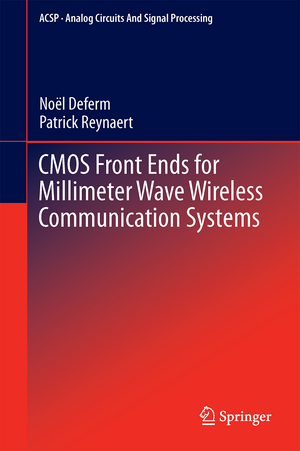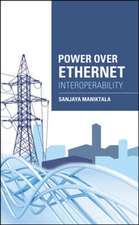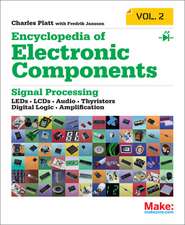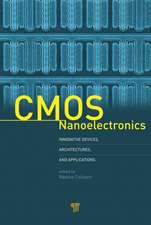CMOS Front Ends for Millimeter Wave Wireless Communication Systems: Analog Circuits and Signal Processing
Autor Noël Deferm, Patrick Reynaerten Limba Engleză Hardback – apr 2015
| Toate formatele și edițiile | Preț | Express |
|---|---|---|
| Paperback (1) | 635.47 lei 6-8 săpt. | |
| Springer International Publishing – 6 oct 2016 | 635.47 lei 6-8 săpt. | |
| Hardback (1) | 641.71 lei 6-8 săpt. | |
| Springer International Publishing – apr 2015 | 641.71 lei 6-8 săpt. |
Din seria Analog Circuits and Signal Processing
- 5%
 Preț: 902.97 lei
Preț: 902.97 lei - 9%
 Preț: 628.98 lei
Preț: 628.98 lei -
 Preț: 388.34 lei
Preț: 388.34 lei - 15%
 Preț: 636.30 lei
Preț: 636.30 lei - 15%
 Preț: 636.80 lei
Preț: 636.80 lei - 18%
 Preț: 941.82 lei
Preț: 941.82 lei - 15%
 Preț: 639.08 lei
Preț: 639.08 lei - 18%
 Preț: 918.48 lei
Preț: 918.48 lei - 15%
 Preț: 631.21 lei
Preț: 631.21 lei - 15%
 Preț: 642.03 lei
Preț: 642.03 lei - 15%
 Preț: 641.85 lei
Preț: 641.85 lei - 18%
 Preț: 887.05 lei
Preț: 887.05 lei - 18%
 Preț: 944.51 lei
Preț: 944.51 lei - 15%
 Preț: 632.55 lei
Preț: 632.55 lei - 15%
 Preț: 641.03 lei
Preț: 641.03 lei - 18%
 Preț: 836.39 lei
Preț: 836.39 lei - 15%
 Preț: 642.18 lei
Preț: 642.18 lei - 15%
 Preț: 639.90 lei
Preț: 639.90 lei - 18%
 Preț: 947.85 lei
Preț: 947.85 lei - 15%
 Preț: 642.51 lei
Preț: 642.51 lei - 15%
 Preț: 631.86 lei
Preț: 631.86 lei - 15%
 Preț: 634.49 lei
Preț: 634.49 lei - 15%
 Preț: 635.47 lei
Preț: 635.47 lei - 15%
 Preț: 640.06 lei
Preț: 640.06 lei - 15%
 Preț: 631.53 lei
Preț: 631.53 lei - 15%
 Preț: 635.65 lei
Preț: 635.65 lei - 18%
 Preț: 941.50 lei
Preț: 941.50 lei - 18%
 Preț: 1112.92 lei
Preț: 1112.92 lei - 15%
 Preț: 636.30 lei
Preț: 636.30 lei - 15%
 Preț: 633.19 lei
Preț: 633.19 lei - 15%
 Preț: 635.80 lei
Preț: 635.80 lei - 18%
 Preț: 888.01 lei
Preț: 888.01 lei - 18%
 Preț: 942.76 lei
Preț: 942.76 lei - 18%
 Preț: 1387.10 lei
Preț: 1387.10 lei - 18%
 Preț: 1115.28 lei
Preț: 1115.28 lei - 15%
 Preț: 633.68 lei
Preț: 633.68 lei - 15%
 Preț: 641.03 lei
Preț: 641.03 lei - 15%
 Preț: 638.57 lei
Preț: 638.57 lei - 15%
 Preț: 642.51 lei
Preț: 642.51 lei - 18%
 Preț: 947.85 lei
Preț: 947.85 lei - 15%
 Preț: 640.71 lei
Preț: 640.71 lei - 15%
 Preț: 640.88 lei
Preț: 640.88 lei - 15%
 Preț: 631.40 lei
Preț: 631.40 lei - 18%
 Preț: 944.19 lei
Preț: 944.19 lei - 18%
 Preț: 944.67 lei
Preț: 944.67 lei - 18%
 Preț: 942.94 lei
Preț: 942.94 lei - 15%
 Preț: 641.20 lei
Preț: 641.20 lei - 20%
 Preț: 555.52 lei
Preț: 555.52 lei - 18%
 Preț: 1003.38 lei
Preț: 1003.38 lei
Preț: 641.71 lei
Preț vechi: 754.95 lei
-15% Nou
Puncte Express: 963
Preț estimativ în valută:
122.79€ • 128.55$ • 101.60£
122.79€ • 128.55$ • 101.60£
Carte tipărită la comandă
Livrare economică 05-19 aprilie
Preluare comenzi: 021 569.72.76
Specificații
ISBN-13: 9783319139500
ISBN-10: 3319139509
Pagini: 181
Ilustrații: XII, 181 p. 187 illus., 55 illus. in color.
Dimensiuni: 155 x 235 x 17 mm
Greutate: 0.45 kg
Ediția:2015
Editura: Springer International Publishing
Colecția Springer
Seria Analog Circuits and Signal Processing
Locul publicării:Cham, Switzerland
ISBN-10: 3319139509
Pagini: 181
Ilustrații: XII, 181 p. 187 illus., 55 illus. in color.
Dimensiuni: 155 x 235 x 17 mm
Greutate: 0.45 kg
Ediția:2015
Editura: Springer International Publishing
Colecția Springer
Seria Analog Circuits and Signal Processing
Locul publicării:Cham, Switzerland
Public țintă
ResearchCuprins
Introduction.- CMOS at Millimeter Wave Frequencies.- Passive Devices: Simulation and Design.- Integrated Differential Amplifiers.- Millimeter Wave Transmitters in CMOS.- A 120GHz Wireless Link.- General Conclusions.
Notă biografică
Noël Deferm (S'09) was born in Diest, Belgium, in 1985. In 2008 he received the degree of M.S. in Electrical Engineering (ir.) from the Katholieke Universiteit Leuven (K.U.Leuven), Belgium. The subject of his MS thesis was on the design of ultra low-power architectures for wireless sensor networks.
He is currently working as a postdoc researcher at the MICAS laboratories of the department of Electrical Engineering (ESAT) of the Katholieke Universiteit Leuven (K.U.Leuven) from which he received the Ph.D. in Engineering Science (dr.) in 2014. While working towards his Ph.D. degree, his main research focus was on mm-wave CMOS circuit design for wireless communication systems.
In 2011, he received the TSMC-Europractice innovation award.
Patrick Reynaert was born in Wilrijk, Belgium, in 1976. He received the Master of Industrial Sciences in Electronics (ing.) from the Karel de Grote Hogeschool, Antwerpen, Belgium in 1998 and both the Master of Electrical Engineering (ir.) and the Ph.D. in Engineering Science (dr.) from the KU Leuven), Belgium in 2001 and 2006 respectively.
From 2001 to 2006, he was a Teaching and Research Assistant within the MICAS research group of the Department of Electrical Engineering (ESAT), K.U.Leuven, Belgium. While working towards his Ph.D. degree, his main research focus was on CMOS RF power amplifiers and analog circuit design for mobile and wireless communications. From 2001 to 2006, he was also a Lector at ACE-Group T Leuven, Belgium were he teached several undergraduate courses on electronic circuit design.
During 2006-2007, he was a post-doctoral researcher at the Department of Electrical Engineering and Computer Sciences of the University of California at Berkeley. At the Berkeley Wireless Research Center, he was working on mm-wave CMOS integrated circuits within the group of Prof. Ali Niknejad. For this research, he received a Francqui Foundation fellowship from the Belgian AmericanEducational Foundation.
During the summer of 2007, he was a visiting researcher at Infineon, Villach, Austria where he worked on the linearization of basestation power amplifiers.
Since October 2007, he is a Professor at the Katholieke Universiteit Leuven, department of Electrical Engineering (ESAT) and a staff member of the ESAT-MICAS research group. His main research interests include mm-wave CMOS circuit design and RF power amplifiers.
Patrick Reynaert is a Senior Member of the IEEE, member of the ESSCIRC TPC, member of the IEDM TPC, chair of the IEEE SSCS Benelux Chapter, co-chair of the Analog, Mixed-signal and RF working group of the Global Semiconductor Alliance and member of the Commission on Innovation Policy of the Flemish Council for Science and Innovation (VRWI).
In 2011, he received the TSMC-Europractice innovation award. In 2011-2012, he served as the Guest Editor for the IEEE Journal of Solid-state Circuits Special Issue on ESSCIRC 2011.
He is currently working as a postdoc researcher at the MICAS laboratories of the department of Electrical Engineering (ESAT) of the Katholieke Universiteit Leuven (K.U.Leuven) from which he received the Ph.D. in Engineering Science (dr.) in 2014. While working towards his Ph.D. degree, his main research focus was on mm-wave CMOS circuit design for wireless communication systems.
In 2011, he received the TSMC-Europractice innovation award.
Patrick Reynaert was born in Wilrijk, Belgium, in 1976. He received the Master of Industrial Sciences in Electronics (ing.) from the Karel de Grote Hogeschool, Antwerpen, Belgium in 1998 and both the Master of Electrical Engineering (ir.) and the Ph.D. in Engineering Science (dr.) from the KU Leuven), Belgium in 2001 and 2006 respectively.
From 2001 to 2006, he was a Teaching and Research Assistant within the MICAS research group of the Department of Electrical Engineering (ESAT), K.U.Leuven, Belgium. While working towards his Ph.D. degree, his main research focus was on CMOS RF power amplifiers and analog circuit design for mobile and wireless communications. From 2001 to 2006, he was also a Lector at ACE-Group T Leuven, Belgium were he teached several undergraduate courses on electronic circuit design.
During 2006-2007, he was a post-doctoral researcher at the Department of Electrical Engineering and Computer Sciences of the University of California at Berkeley. At the Berkeley Wireless Research Center, he was working on mm-wave CMOS integrated circuits within the group of Prof. Ali Niknejad. For this research, he received a Francqui Foundation fellowship from the Belgian AmericanEducational Foundation.
During the summer of 2007, he was a visiting researcher at Infineon, Villach, Austria where he worked on the linearization of basestation power amplifiers.
Since October 2007, he is a Professor at the Katholieke Universiteit Leuven, department of Electrical Engineering (ESAT) and a staff member of the ESAT-MICAS research group. His main research interests include mm-wave CMOS circuit design and RF power amplifiers.
Patrick Reynaert is a Senior Member of the IEEE, member of the ESSCIRC TPC, member of the IEDM TPC, chair of the IEEE SSCS Benelux Chapter, co-chair of the Analog, Mixed-signal and RF working group of the Global Semiconductor Alliance and member of the Commission on Innovation Policy of the Flemish Council for Science and Innovation (VRWI).
In 2011, he received the TSMC-Europractice innovation award. In 2011-2012, he served as the Guest Editor for the IEEE Journal of Solid-state Circuits Special Issue on ESSCIRC 2011.
Textul de pe ultima copertă
This book focuses on the development of circuit and system design techniques for millimeter wave wireless communication systems above 90GHz and fabricated in nanometer scale CMOS technologies. The authors demonstrate a hands-on methodology that was applied to design six different chips, in order to overcome a variety of design challenges. Behavior of both actives and passives, and how to design them to achieve high performance is discussed in detail. This book serves as a valuable reference for millimeter wave designers, working at both the transistor level and system level.
- Discusses advantages and disadvantages of designing wireless mm-wave communication circuits and systems in CMOS;
- Analyzes the limitations and pitfalls of building mm-wave circuits in CMOS;
- Includes mm-wave building block and system design techniques and applies these to 6 different CMOS chips;
- Provides guidelines for building measurement setups to evaluate high-frequency chips.
Caracteristici
Discusses advantages and disadvantages of designing wireless mm-wave communication circuits and systems in CMOS Analyzes the limitations and pitfalls of building mm-wave circuits in CMOS Includes mm-wave building block and system design techniques and applies these to 6 different CMOS chips Provides guidelines for building measurement setups to evaluate high-frequency chips Includes supplementary material: sn.pub/extras
















